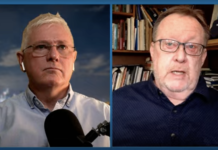Source: The Conversation (Au and NZ) – By Denis Muller, Senior Research Fellow in the Centre for Advancing Journalism, University of Melbourne
In appointing Ita Buttrose to chair the ABC, the Morrison government might just have got it right, having got it so hopelessly wrong last time.
Buttrose comes with what might be called three big negative advantages:
-
she is not a former business associate of the prime minister
-
she is not a well-known climate-change denier like Maurice Newman, whom John Howard appointed in 2007
- she is not a strident culture warrior like Keith Windschuttle, Ron Brunton and Janet Albrechtsen, with whom Howard stacked the ABC board in the early 2000s.
She also has many positive advantages.
She’s tough. She worked for the Packers — Frank and Kerry – and for Rupert Murdoch at senior management and board level. That is not territory for shrinking violets.
She knows the media – albeit mainly print and commercial television. She was founding editor of the ground-breaking magazine Cleo, an assertive magazine for women, openly discussing what were then taboo subjects such as women’s sexuality, which it celebrated with a nude male centrefold.
Its advertising pitch was, “What Cleo wants, Cleo gets”, a statement encouraging women to be ambitious and take their place in the world.
She went on to edit The Australian Women’s Weekly, the Packer flagship, and later was editor-in-chief of Murdoch’s Daily Telegraph and Sunday Telegraph in Sydney, before being appointed by him to the News Limited board.
Read more: Constant attacks on the ABC will come back to haunt the Coalition government
As an editor in the 1980s, she exhibited a strong sense of decency and fairness by standing out against the moral panic in some elements of the media over HIV-AIDS when that disease first emerged in Australia.
Hysterical preachers thundered about how the wrath of God was being brought down on homosexuals and people who engaged in extra-marital sex. Buttrose was part of the more responsible elements of media that repudiated this untruthful and prejudicial drivel.
When tragic cases emerged of HIV-contaminated blood having been used in blood transfusions, she and others such as the then chair of the National AIDS Task Force, Professor David Penington, worked hard to restore public trust in the blood bank, once procedures had been adopted to eliminate the risk.
More recently as national president of Dementia Australia she has been a high-profile advocate for a stronger public policy response to dementia and greater public awareness of the needs of people with dementia.
Given her background, and her demeanour at the media conference at which the prime minister announced her appointment, she promises to bring strong moral leadership to the ABC.
And if it’s one thing the ABC needs in the wake of the disaster that engulfed the former chair Justin Milne and managing director Michelle Guthrie last September, it is strong moral leadership.
Buttrose said she was a devoted ABC listener who believed passionately in the ABC’s independence. She said her priority was to restore stability to the board and management.
She also endorsed the ABC’s continued involvement in digital media, which will give no comfort to those in commercial media who have been campaigning to have the ABC’s wings clipped in this area.
Twice she reiterated the level of trust the Australian public has in the ABC’s news service, making the point that on ABC news, the public got stories they did not get on commercial media.
Asked whether the ABC needed more funding, she said she had not seen the books, but if she thought more funding was needed, “I won’t be frightened to ask”.
Buttrose’s stated attitude to the ABC and the answers she gave at the media conference evoked memories of Sir Zelman Cowen.
He was appointed governor-general in 1977 after Sir John Kerr had bitterly divided the nation by sacking Gough Whitlam as prime minister in 1975.
Upon his appointment, Sir Zelman said he wanted to bring “a touch of healing”.
There is still a lot of healing to be done at the ABC, and the scrutiny arising from last year’s crisis is not over yet.
The surviving members of the ABC board are scheduled to appear next Tuesday (March 5) at the Senate inquiry into political interference in the ABC. What they did – or failed to do – in protecting the independence of the ABC will undoubtedly be a central question.
Read more: Michelle Guthrie’s stint at ABC helm had a key weakness: she failed to back the journalists
A major cause of that crisis was the stacking of the board with political mates and special-interest groups who share the government’s worldview.
The ABC Act contains a provision designed to prevent this, but it has been routinely ignored by ministers and prime ministers for decades.
The act provides for an independent nominations panel whose job is to present names to the minister for communications and the prime minister.
Ita Buttrose was not nominated by the panel, as the prime minister revealed in his announcement. Even so, it is a choice that has merit, and if she succeeds in reasserting the ABC’s independence from political interference, that will make a pleasing irony.
– ref. Ita Buttrose’s appointment as new ABC chair a promising step in the right direction – http://theconversation.com/ita-buttroses-appointment-as-new-abc-chair-a-promising-step-in-the-right-direction-112683








